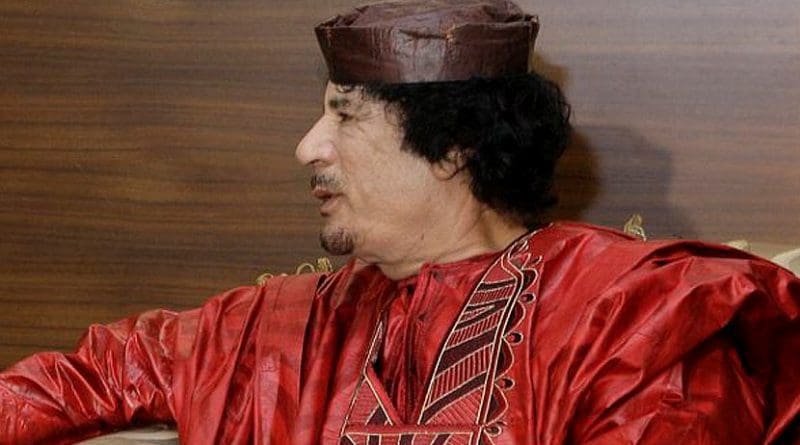The Last Days of Gaddafi? Collapse in Libya
The regimes are panicking in pools of blood. The earth, it would seem, is moving beneath the feat of those who have stayed in power for decades in the states of Africa and the Middle East. The Libyan authorities have been trigger happy, butchering hundreds. Those in Bahrain are slaying various protesters with an indiscriminate ease. How much blood will be spilt before these regimes collapse?
Looking more like a frayed drag queen the longer he remains in office, Muammar Gaddafi, after almost 42 years in power, is losing his nerve. The spectacular last act is being called for, and armies are being summoned. (Will they materialise? Increasingly, this is not the case) As Robert Fisk noted in The Independent, ‘Gaddafi was in a class of his own, Mickey Mouse and Prophet, Batman and Clark Gable and Anthony Quinn playing Omar Mukhtar in Lion and the Desert, Nero and Mussolini (the 1920s version), and, inevitably – the greatest actor of them all – Muammar Gaddafi.’
Despotisms are often vast theatres of spectacle. The act must go on, because that is very often the only thing that sustains the state in permanent emergency. When the singing stops, and the praise dries up, the actors will go home, and the maestro shall relinquish the baton.
The prognosis for the government in Tripoli is nothing short of dire. The Gaddafi regime’s survival is based on a calculus of blood. Gaddafi has called the demonstrators ‘rats’. Based on few reports coming from activists, aerial bombardments have taken place. Snipers have been deployed. But even spectacular displays of bloody defence eventually fail. The opposition is proving defiant, and smells the weakness of the regime, calling for more nights of protest in Tripoli’s Green Square.
The breaches of the dam have been noted. Even within the Libyan regime, arguments are being made, quite openly, that ‘genocide’ is being practised. Ambassadors have resigned. Abdel-Moneim al-Houni, Libya’s ambassador to the Arab League in Cairo, has openly called for Gaddafi to leave office. The deputy permanent representative to the United Nations, Ibrahim Dabbashi, has made the observation that, ‘We are sure that what is going on now in Libya is crimes against humanity and crimes against war.’ A faction of Libyan army officers has issued a statement calling for soldiers to embolden the protesters and join them. Two air force colonels have landed in Malta seeking asylum. In Libya’s second city, Benghazi, the flag of the monarchy overthrown in 1969 can be seen flying.
Rumours of him fleeing are also circulating. Ever the thespian, he appeared on television with an umbrella from a car, proclaiming that he was neither in France nor Venezuela, but ‘still here’. There is even a note of comedy in these rituals of a regime on the run: Gaddafi has been looking for a facelift. Revolutionary gains, it would seem, are well and truly sagging.
In truth, he is not the only one in need of cosmetic re-adjustment. The international community has done much to integrate the Gaddafi regime. The wily fox has been pampered and spoiled, a sign, in a sense, of the genius of his acting. For that reason, any statement that now comes out of Downing Street, New York, or Washington should be looked at with suspicion. There is only one show that matters, and they are not part of it.
In the end, the circularity of revolution uttered by George Orwell remains true, for Gaddafi, and for other revolutions that put those like him in power. ‘One does not establish a dictatorship in order to safeguard a revolution; one makes a revolution in order to establish a dictatorship.’ That dictatorship may be about to crumble.

